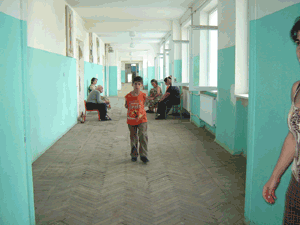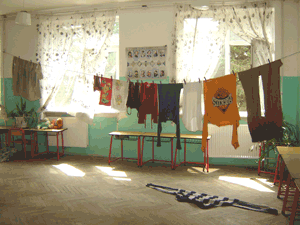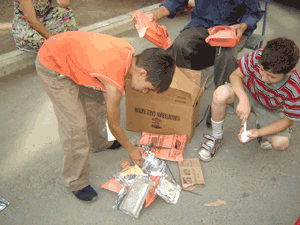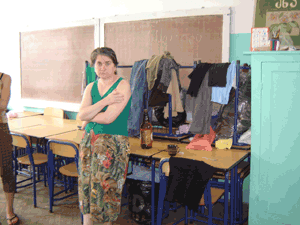Bad food and permanent threats
 Nona Suvariani,Tbilisi
Nona Suvariani,Tbilisi
IDPs live in unbearable conditions in Public School # 48 in Tbilis. They have neither water, nor food. Besides that strange people force them to leave the building and move to Gori. The IDPs are against return because they do not have houses anymore and their security is not guaranteed.
All 100 IDPs sheltering in the school are from Didi Liakhvi Valley. They witnessed looters enter their houses and destroy the property they had collected for so many years. After that the robbers burnt down the looted houses in front of their owners.
A woman from the village of Kurta, who did not want to tell her name, recalled the situation as follows:
“Our village is located between Java and Tskhinvali. Russians were shooting at us from tanks and aircrafts. We were hiding in basement. We could not even get to the water-tap in the yard. We saw how they burnt houses of our neighbors where dead bodies were in. killed domestic animals were spread in the street and it made terrible smell all around. I remained there because of my old father-in-law. I did not expect Russians to enter our village.”
“When they entered in our yard, we were sitting at the table. Immediately we raised our hands and when I told them I was Georgian they asked me again “where I was hiding “boeviks”? I denied and they did not insult us. Then strange people were coming; they were breaking into our houses and shouting at us. They took everything form my house in front of me. They took my cattle too. Robbers threatened with burning down everything unless we left the village. They were going to burn the old man I was staying with and threatened me with the same unless we left the area immediately. I did not know where to go; but said it was dangerous to stay there. At night we were bombed again…”
“In the morning we were luckier. Red Cross people came to the village. They offered people to take away whoever wanted. We were a bit confused and did not know to trust to them or not. When they called us for the fourth time we sat in vehicles and followed them. As soon as I left house, robbers entered there and started to take what was left there. They intended to burn the house.”
The woman from the valley states she has lost the sense of life. “I will never return my old life and property.”
The men left this village, as many others before occupants entered there.
“I received a message from Orjonikidze (old name of Vladikvakaz, North Ossetia, Russia) which informed me that troops were coming in our direction and suggested local men to leave the area. I did not know who had remained in the village and I fled from there alone. They were shooting me from so-called “Gaubitsa”. Finally they shot me near the Achabeti Bridge. I got into the forest and there I met many IDPs. Most of them were old people. The situation I witnessed there is much worse then the tragedy in Chuberi. Those who could not walk were placed in the car. The forest was also being bombed. At Tsveriakho (a place in the forest) boys suggested to walk one-by-one. Chechens were in front of us and if they saw us together, they might kill us. It was getting dark when I saw nearly 40 Chechens. I thought they would kill me but when they saw me called “Zemliak” (Russian for countryman)… They said: “you are lucky that we are standing here and would not kill you. They were calming me all the time. On my way through forests we saw ruined villages, dead bodies scattered in the streets, I was getting crazy,” said a resident of the villages.
He arrived in Tbilisi through similar difficulties and joined “his  people”. However in the capital they suffered from some other problems. They are still hungry and tensed in the expectation of being evicted from the school building.
people”. However in the capital they suffered from some other problems. They are still hungry and tensed in the expectation of being evicted from the school building.
Irma Kasradze, a resident of the village of Kheiti, walked 15 kilometers until she met the car. Initially she arrived in Gori and then was transported to Tbilisi by bus.
Irma Kasradze: “As soon as we arrived in Tbilisi went to the City Hall. We were standing there for two-three days and nobody met us. They were making fun of us. We were sleeping in buses. Officials just suggested us to get registered.”
“Then they sent us to this school but initially they changed their mind claiming there was no electricity and water supply in the building. There was a controversy in the school. Finally we broke into here under force because the officials from the City Hall had advised us to do so. When men made school administration to open the door, we found out that the school had water and electricity supply.”
Some people were coming and making lists. They did nothing more. Local people helped us. The state provided only bread to our school. Finally they brought dry-food. We are without attention.”
Marine Ghvinadze, teacher of the Public School 46, recalls that the food was not nice from the very beginning either.
Marine Ghvinadze: “They used to bring sausages but we did not have fridge and it was getting spoilt in the heat. Now we have fridge but they do not bring sausages anymore. These people are fed by local inhabitants. There were cases when potato, eggs and buckwheat was delivered. Finally these people were fed only by the food apportioned by the UN. Current situation started about 5-6 days before. They bring food twice a day and two people get one loaf of bread. They claim that it is maximum of their possibilities.”
 To demonstrate how impossible was for them to eat the dry food, they brought boxes of dry-food delivered as humanitarian aid and opened them in front of us. None of us wished to try the food as soon as strange smell came out of the boxes. The IDPs state they cannot give this food to children. The only think children eat from the aid is chocolate and cakes. But it is not enough to feed them.
To demonstrate how impossible was for them to eat the dry food, they brought boxes of dry-food delivered as humanitarian aid and opened them in front of us. None of us wished to try the food as soon as strange smell came out of the boxes. The IDPs state they cannot give this food to children. The only think children eat from the aid is chocolate and cakes. But it is not enough to feed them.
Old couple sheltering in Public School # 48 was less lucky. Unlike them they arrived here several days ago. They could not get registered because since their coming nobody has come to register IDPs. They are too weak to go to the registration personally. Consequently, the food, even with strange smell, is not apportioned for them. Other IDPs share their food to the old couple.
In addition to hunger, strange people visit shelters and demand IDPs to leave school immediately. Khvicha Kekelishvili, the organizer of the IDPs, was called with the same request in our presence. “Tents are set up in Gori and go there. Food will not come to your school anymore; it will be taken to Gori. Bread has not been brought to them for two days already. Further more, sewerage system does not work and part of IDPs do not have water supply. Thus, these people are forced to leave the shelter.
Lali Muradashvili, an IDP: “I talked with my brother several  minutes ago. He lives in the village of Garejvari next to my village of Karaleti. I informed him that we are being forced to move to Gori because school term is starting in September and they need the building. He replied Russians have opened checkpoints in Karaleti and are getting ready for war. He said he was also coming to Tbilisi and how could I return. People say that gunfire is still heard in the villages of uppers zone. We will leave the school building but would not go to Gori. That means we will go the battle-field again. I exactly know that people are still coming to Tbilisi from Gori.”
minutes ago. He lives in the village of Garejvari next to my village of Karaleti. I informed him that we are being forced to move to Gori because school term is starting in September and they need the building. He replied Russians have opened checkpoints in Karaleti and are getting ready for war. He said he was also coming to Tbilisi and how could I return. People say that gunfire is still heard in the villages of uppers zone. We will leave the school building but would not go to Gori. That means we will go the battle-field again. I exactly know that people are still coming to Tbilisi from Gori.”
The IDPs keep contact with Badri Basishvili, the governor of the valley and they report him about all problems they encounter. The governor categorically opposes to take people to Gori. “Unless they are provided with minimal living conditions, we will not take them to Gori. As far as I know the problems of Gori residents are not resolved yet and what will they do about 15 thousand people from the valley. As for food, the problem is the same everywhere. They have brought some American food and our people cannot get that food. I think the situation will change for better tomorrow or the day after tomorrow.”
Desperate people state that they will return to their villages only after peacekeepers give them complete guarantee of security.



